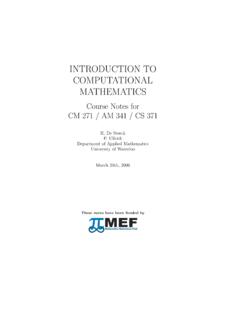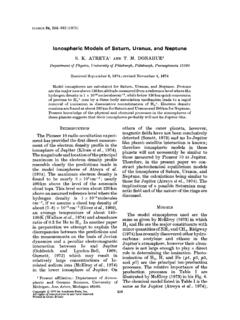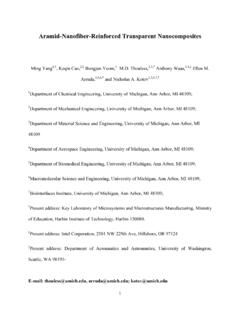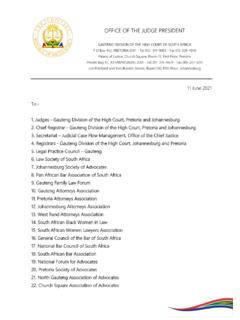Transcription of COST AND FEE ALLOCATION IN CIVIL PROCEDURE2 south africa
1 COST AND FEE ALLOCATION IN CIVIL PROCEDURE REPUBLIC OF south africa Introduction south African law is an uncodified CIVIL law system with Roman-Dutch law, and originally Roman law, as its major formative element. Since the beginning of the nineteenth century a strong thread of English law has been woven into the fabric of that As such, it is one of the so-called mixed jurisdictions at the intersection of CIVIL law and common In particular, procedural techniques have largely assimilated the English patterns. The legal profession is organised on the English model with a distinction being made between attorneys (solicitors) and advocates (barristers). Like his English counterpart, the south African advocate gets his brief from an attorney (solicitor) and not directly from the client. The modern south African law of costs, which in broad terms follows the English pattern, is to be found in a multitude of decided cases and a large number of statutory 1 See HJ Erasmus the Interaction of Substantive and Procedural Law: the Southern African Experience in Historical and Comparative Perspective (1990) 1 Stellenbosch LR 348; HJ Erasmus The interaction of Substantive Law and Procedure in Southern Cross.
2 CIVIL Law and Common law in south africa ed Reinhard Zimmermann and Daniel Visser (Clarendon Press, Oxford 1996) 140. 2 See, in general, Southern Cross. CIVIL Law and Common Law in south africa ed Reinhard Zimmermann and Daniel Visser (Clarendon Press, Oxford 1996); Mixed Legal Systems in Comparative Perspective ed Reinhard Zimmermann, Daniel Visser and Kenneth Reid (Juta & Co Ltd, Cape Town 2004) 3 The principal general work is that of AC Cilliers Law of Costs 3rd ed (LexisNexis, Durban 2008). Other major texts are the Chapter on Costs in Herbstein and Van Winsen The CIVIL Practice of the High Courts and the Supreme Court of Appeal of south africa 5th ed by Cilliers, Loots and Nel (Juta & Co Ltd, Cape Town 2009) and Jones and Buckle. The CIVIL Practice of the Magistrates Courts in south africa 9th ed by Erasmus and Van Loggerenberg (Juta & Co Ltd, Cape Town 1996, 1997) vol II, 33-23 et seqq. 2[1] The Basic Rules The basic rules were stated as follows by the Constitutional Court in Ferreira v Levin NO and Others4: The Supreme Court has, over the years, developed a flexible approach to costs which proceeds from two basic principles, the first being that the award of costs, unless expressly otherwise enacted, is in the discretion of the presiding judicial officer, and the second that the successful party should, as a general rule, have his or her costs.
3 Even this second principle is subject to the first. The second principle is subject to a large number of exceptions where the successful party is deprived of his or her costs. Without attempting either comprehensiveness or complete analytical accuracy, depriving successful parties of their costs can depend on circumstances such as, for example, the conduct of parties, the conduct of their legal representatives, whether a party achieves technical success only, the nature of litigants and the nature of proceedings. The purpose of an award of costs to a successful litigant is .. to indemnify him for the expense to which he was been put through having been unjustly compelled to initiate or defend litigation, as the case may be. Owing to the operation of taxation, however, such an award is seldom a complete indemnity; but that does not affect the principle on which it is A costs order is not intended to be compensation for a risk to which a litigant has been exposed, but a refund of expenses actually incurred.
4 4 1996 (2) SA 621 (CC) at 624B C (par [3]). 5 Texas Co (SA) Ltd v Cape Town Municipality 1926 AD 467 at 488. 3A distinction is made between party-and-party costs and attorney and client costs. Party and party costs are those costs that have been incurred by a party to legal proceedings and that the other party may be ordered to pay. They do not include all the costs that a party to a suit may have occurred, but only those costs, charges and expenses that appear to the taxing master to have been necessary or proper for the attainment of justice or for defending the rights of any party. Those costs, charges and expenses will include only those costs incurred in the litigation itself. So, for instance, costs of obtaining counsel s opinion as to a party s prospects of success in a contemplated action will not be allowed as between party and party. The taxing master of the court in which the litigation took place decides which costs, charges and expenses incurred by a litigant who has been awarded costs against his adversary, should be allowed as having been necessarily or properly A litigant who has an award of costs in his or her favour, submits a bill of costs to the taxing master for taxation.
5 A bill of costs is drawn in accordance with the tariffs of fees set in the Rules of the court concerned, and in accordance with established practice where no fee is prescribed for a particular service. Attorney-and-client costs are the costs that an attorney is entitled to recover from a client for the disbursements made on behalf of the client, and for professional services rendered. These costs are payable by the client whatever the outcome of the matter for which the attorneys services were engaged and are not dependent upon any award of costs by the court. In the wide sense, it includes all the costs that the attorney is 6 The principal text is that by MS Jacobs and NEJ Ehlers Law of Attorneys Costs and Taxation Thereof (Juta & Co Ltd, Cape Town 1979). 4entitled to recover against the client on taxation of the bill of costs. The term is also used in a narrower sense as applying to those charges and expenses as between attorney and client that ordinarily the client cannot recover from the other party.
6 The costs and expenses of witnesses (including expert witnesses) are borne by the litigant who calls the witness to testify on his or her behalf. A successful litigant who gets a costs order in his favour will include such expenses in the bill of costs submitted to the taxing master. Such costs, especially the costs of expert witnesses, may constitute a significant factor in the litigation, and all the costs thus incurred may not, depending upon the circumstances, be recoverable in full on a party and party bill of costs. The basic principles set out above also apply to appeals. The principle is encapsulated in Rule 18 of the Rules of the Supreme Court of Appeal which provides as follows: With a view to affording the party who has been awarded an order for costs a full indemnity for all costs reasonably incurred by him or her in relation to his or her claim or defence and to ensure that all such costs shall be borne by the party against whom such order has been made, the taxing master shall on every taxation allow such costs, charges and expenses as appear to him or her to have been necessary or proper for the attainment of justice or for defending the rights of any party, but, save as against the party who incurred them, no costs shall be allowed which appear to the taxing master tom have been incurred or increased through over-caution, negligence or mistake, or by payment of a special fee to counsel or by other unusual expenses.
7 5In the case of an appeal there is the additional expense of preparing the record of the proceedings of the court of first instance. In the case of a complex and lengthy trial in the court of first instance, the cost of preparing the record may be prohibitive. The Supreme Court of Appeal requires the parties to an appeal to restrict the record to the evidence relevant to the issues raised in the appeal. Unreasonable failure to do so, may result in an adverse order as to There is no difference in principle between the Constitutional Court and the Supreme Court of Appeal in relation to the law of costs although, for reasons of policy dictated by and related to its constitutional jurisdiction, its approach to awards of costs differs in some respects from that in the other In 1996 the then Deputy President of the Constitutional Court, having referred to the general rule that subject to the discretion of the court, costs should follow the result and the losing party should be ordered to pay the costs of the successful party, pointed out that litigants seeking to test the constitutionality of a statute usually seek to ventilate an important issue of constitutional Thus in Transvaal Agricultural Union v Minister of Land Affairs10 the President of the Constitutional Court said.
8 7 A recent example is Price Waterhouse Coopers Inc and Others v National Potato Co-operative Ltd 2003 (3) SA 54 (SCA); [2004] 1 All SA 20 (SCA) in which the respondent s attorney was deprived of part of his fees for insisting on the inclusion in the record of seven volumes of documents which were largely irrelevant to the issues raised in the appeal. 8 President of the Republic of south africa and Others v gauteng Lions Rugby Union and Another 2002 (2) SA 64 (CC) at 72E. 9 Ex parte gauteng Provincial Legislature: In re Dispute Concerning the Constitutionality of Certain Provisions of the gauteng School Education Bill of 1995 1996 (3) SA 165 (CC) at 183B C. 10 1997 (2) SA 621 (CC) at 635H. 6 There may be good reasons why a losing litigant who raises a substantial constitutional issue before this Court ought not to be ordered to pay the costs of the successful party. This is, however, not an inflexible rule, and where the grounds of attack on the impugned statute are frivolous or vexatious, or where the litigant has acted from improper motives or there are other circumstances which make it in the interest of justice that such costs be paid by the losing party, the Constitutional Court might direct that a losing party pay the costs of the other [II] Exceptions and Modifications There are isolated cases in which a statute expressly authorises a court to depart from the general rule that costs follow the event.
9 Thus, for example, section 32(2) of the National Environmental Management Act 107 of 1998 authorises a court not to award costs against unsuccessful litigants in certain proceedings aimed at the protection of the environment. In terms of section 21(2)(a) of the Promotion of Equality and Prevention of Unfair Discrimination Act 4 of 2000 and the Regulations promulgated under the Act, a court may depart from the general rule in the interest of equity and fairness .12 There are other statutes which contain provisions pertaining to costs, but these provisions are all subject to the overriding principle that the award of costs, unless 11 Ex parte gauteng Provincial Legislature: In re Dispute Concerning the Constitutionality of Certain Provisions of the gauteng School Education Bill of 1995 1996 (3) SA 165 (CC) at 183B C.
10 This approach was underscored by the Supreme Court of Appeal in Kini Bay Village Association v The Nelson Mandela Metropolitan Municipality, Chase Street Properties (Pty) Ltd and Pierre Kolesky 2009 (2) SA 166 (SCA) at 166. 12 The provisions of the Act are considered in Manong and Associates (Pty) Ltd v City Manager, City of Cape Town 2009 (1) SA 644 (EqC). 7expressly otherwise enacted, is in the discretion of the presiding judicial officer. An example of such a statutory provision is the Income Tax Act 58 of 1962 which deals with costs in appeals against assessments of income tax to the tax court established in terms of section 83 of the Act. Another example is the Expropriation Act 63 of 1975 which in section 15(2) makes provision for a special order as to costs under certain There are no mandatory pre-litigation procedures, such as mandatory mediation, which may impact on cost and fee ALLOCATION .















